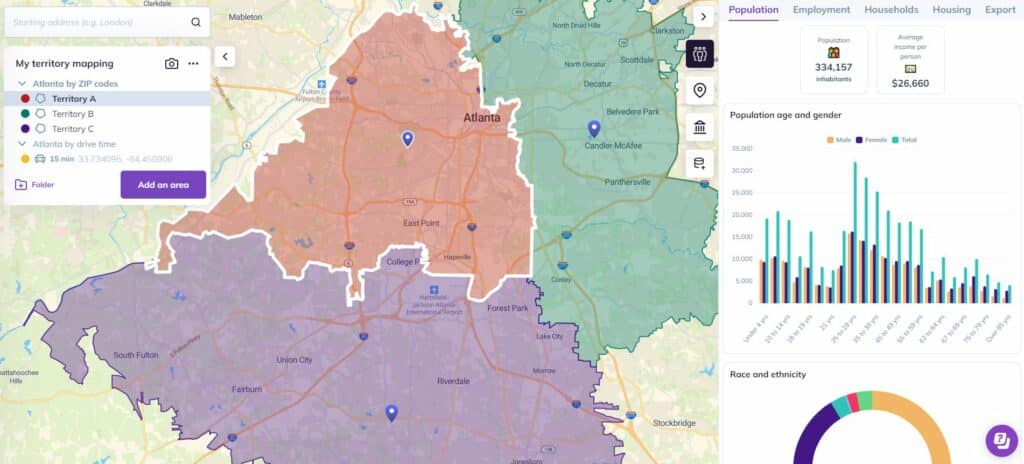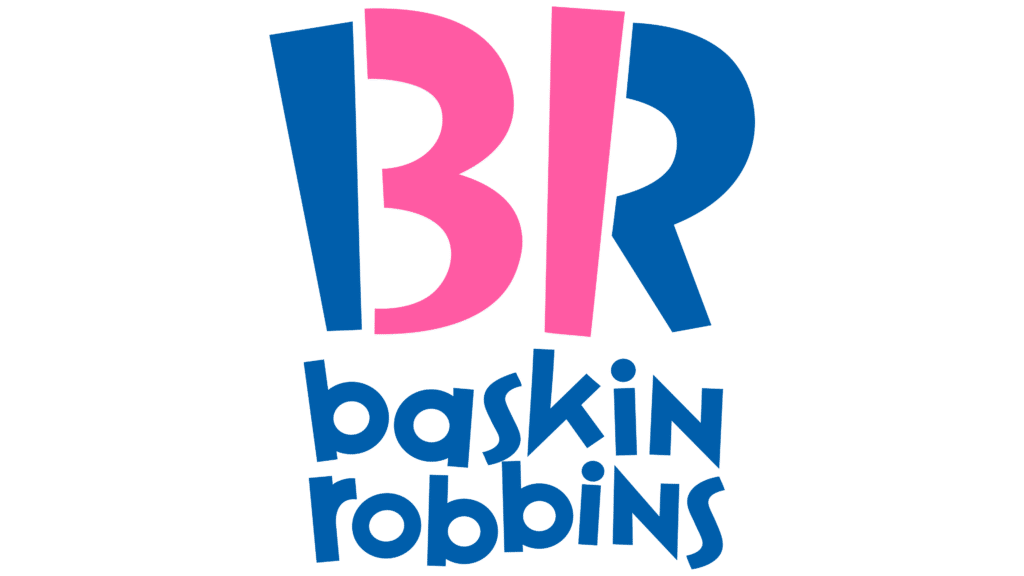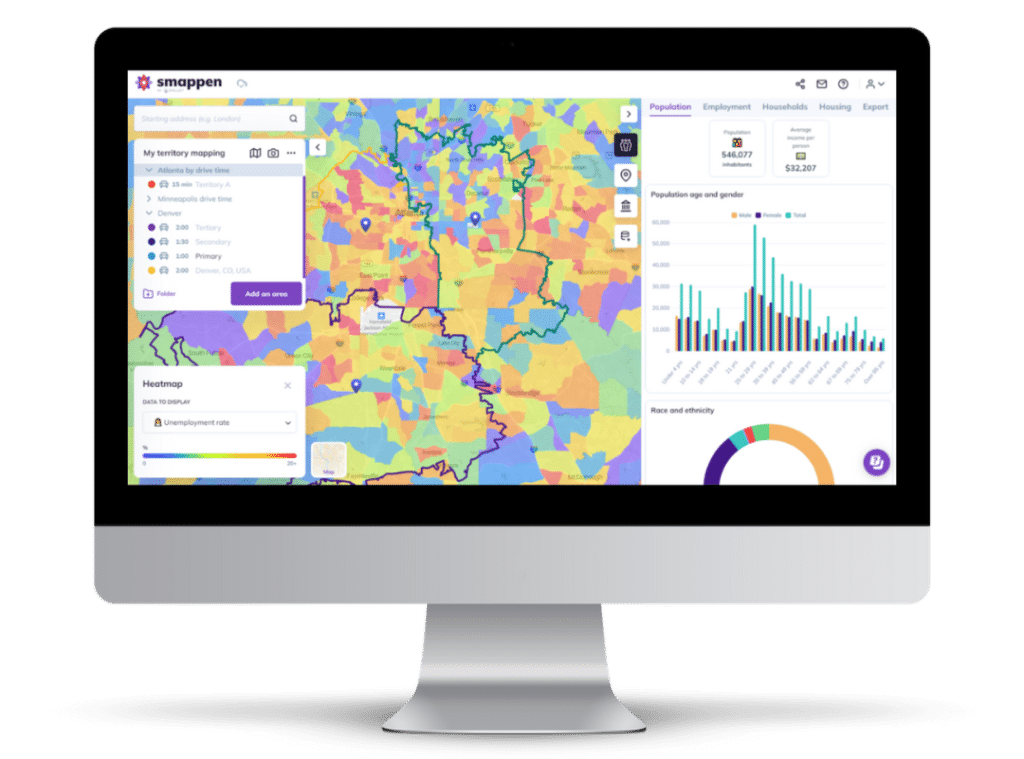Territory Mapping:
How to Design Smarter Territories for Your Network
Step into the world of strategic territory mapping – the cornerstone of efficient sales strategies and successful franchise expansion. This hub is your gateway to a series of articles that dive deep into the realm of territory mapping, offering insights on topics spanning sales optimization to franchise territory allocation. Whether you’re steering a sales team to greater heights or steering a brand towards growth, our curated resources are here to equip you with the expertise needed to navigate the intricate world of territory mapping.
What is Territory Mapping?
Territory mapping involves creating visual representations of geographical areas to allocate resources, manage franchise and sales regions, and plan strategic expansions.
Far from being just a pretty map, it’s a powerful strategic tool.
Done well, it helps you:
Maximize market coverage
Balance workloads and opportunities
Avoid cannibalization between territories
Unlock data-driven insights about your performance
And when done with Smappen? It’s fast, visual, collaborative.
Benefits of Territory Mapping Software
Create Maps
Use the software to create detailed maps that reflect your business objectives. Then analyze and regularly review the maps to identify trends and make necessary adjustments.
Enhanced Strategic Planning
Mapping software allows for precise visualization of market areas, helping businesses identify opportunities and challenges within specific regions. This insight is invaluable for strategic planning and resource allocation.
Improved Sales Management
By clearly defining sales territories, you can ensure balanced workloads among sales teams, prevent overlaps, and optimize customer coverage. This leads to increased productivity and customer satisfaction.
Data-Driven Decision Making
Collect relevant data such as customer locations, sales figures, and demographic information. Make informed decisions based on real-time information, leading to better outcomes and reduced risks.
Why Invest in Territory Mapping?
Whether you manage a franchise network, a multi-site business, or a growing sales team, territory mapping plays a key role in:
Ensuring each rep or location has fair and realistic goals
Aligning field efforts with real-world market potential
Planning growth with full visibility on white space
Supporting high-stakes decisions like renewals, relocations, or buyouts
Sales Mapping vs. Territory Optimization
Let’s make one thing clear: not all mapping is strategic.
Basic mapping is often static: just drawing shapes around postcodes or ZIPs.
Territory optimization adds real intelligence: balancing workloads, segmenting opportunities, analyzing performance.
With Smappen, you get both:
✔️ Intuitive tools to draw and edit territories
📊 Real data to evaluate and improve them
🧠 Smart features to identify overlaps, gaps, and areas of opportunity
Choosing the Right Territory Mapping Software
When selecting a software, consider the following features:
User-Friendly Interface: Ensure the software is intuitive and easy to navigate.
Customization Options: Look for tools that allow for tailored maps to fit your specific business needs.
Data Integration: The ability to integrate various data sources enhances the depth of analysis.
Scalability: Choose software that can grow with your business.
Smappen: Simplifying Territory Mapping for Businesses
Smappen is a user-friendly mapping software designed to help businesses visualize and manage their geographical areas effectively. With its intuitive interface, users can easily create, edit, and analyze territories without the need for technical expertise.
The tool offers features such as customizable maps, real-time data integration, and collaborative tools, making it ideal for business owners and franchisors looking to optimize their operations and drive growth.
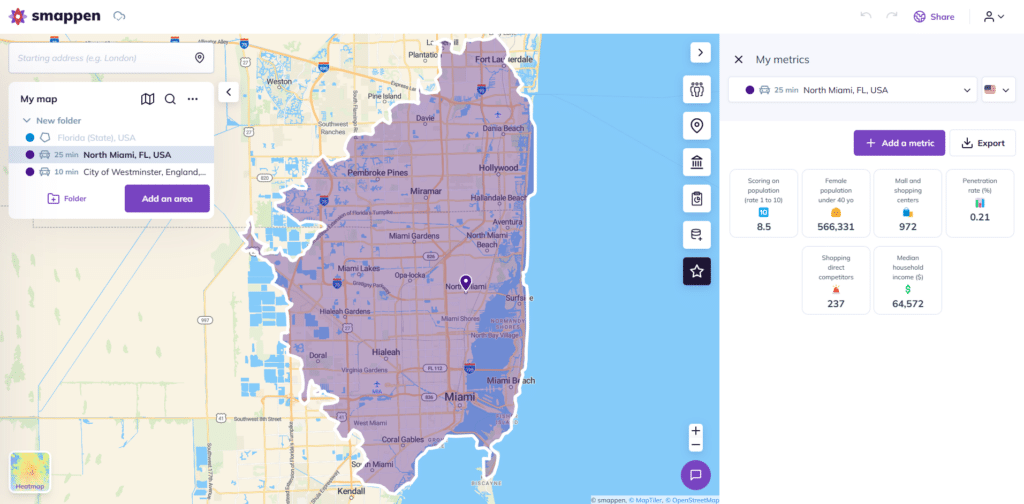
Examples of franchise territories by country
United States – ZIP Code Territories
In the U.S., franchise and sales territories are often defined by ZIP codes. With Smappen, you can:
Visualize areas by ZIP, city, or county
Analyze by population, income, or customer locations
Identify territory overlap between franchisees
Ideal for retail, food, and home services networks.
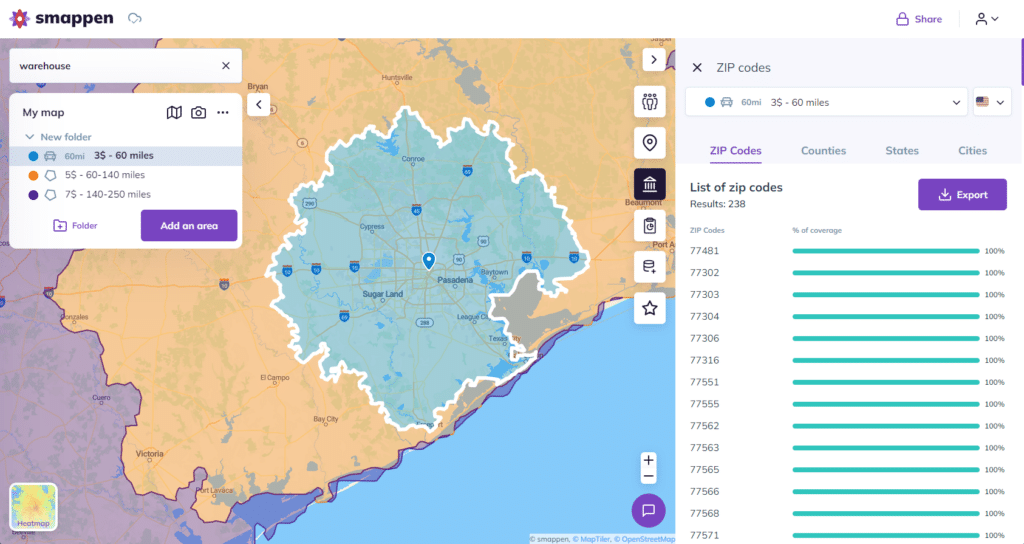
United Kingdom – Postcode Sectors
In the UK, territory management often relies on outward codes (e.g. SW1, EC2). Smappen helps:
Combine postcode sectors into custom regions
Track penetration rate and customer reach
Map competition proximity
Works great for healthcare, education, and property networks.
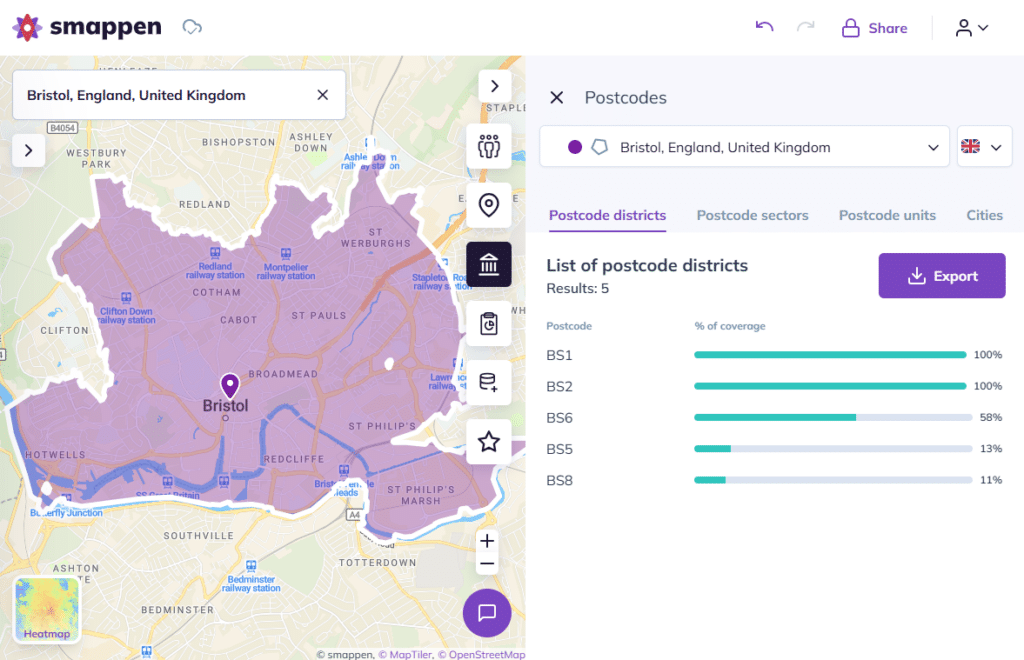
Canada – Postal Code Precision
In Canada, mapping with FSA (first 3 digits of the postal code) allows:
Urban vs rural territory segmentation
Smart coverage in bilingual or multicultural areas
Optimization by drive-time (a key in vast provinces)
Perfect for service franchises and B2B field teams.
Best Practices & Key Metrics
🧠 Top tips:
Base your territories on real potential, not just surface area
Adjust regularly: every 6–12 months or before each campaign
Cross-check with customer data and sales figures
📊 Monitor these KPIs:
Coverage rate vs market size
Revenue per territory
Client density vs effort
Overlap / white space
Recommended Tools
| Tool | Pros | Use Case |
|---|---|---|
| Smappen | Easy, visual, data-powered | Franchises, Sales Teams |
| Maptitude | Strong analysis, more complex | GIS/analyst-heavy orgs |
| SmartDraw | ZIP-based static mapping | Basic sales routing |
| CaptivateIQ | Complex commission/turf logic | Enterprise sales teams |
Ready to Map Smarter?
No matter where your team is — or where you’re expanding — Smappen helps you map smarter, faster, and with more impact.
Read our best articles on the topic

Territory Mapping: Strategies for Sales and Franchise Growth
Explore the power of territory mapping – a game-changing approach for optimizing sales performance and franchise expansion.
Answering your questions
What is territory mapping?
Territory mapping is the process of visualizing and organizing geographical areas for business purposes like sales, service coverage, or franchise development. It’s crucial because it helps balance workloads, identify new market opportunities, and streamline operations—all of which can boost profitability and customer satisfaction.
How does territory mapping software help franchisors and business owners?
Mapping tools gives franchisors and business owners the power to create clear, data-driven territorial boundaries. This ensures franchisees don’t step on each other’s toes, while making expansion easier and more strategic. It’s like giving your business GPS for growth.
What are the benefits of territory mapping?
Improved sales performance
Enhanced customer satisfaction: Efficient territory management ensures timely service and support, leading to improved customer relationships.
Cost efficiency: Reduces travel time and expenses by optimizing routes and minimizing redundant efforts.
Data-driven decisions: Utilizes geographic and demographic data to make informed decisions about market strategies and resource allocation.
Scalability
How to create a territory map online?
Creating a territory map online involves several steps:
Choose a mapping tool: Select a reliable territory mapping tool like Smappen that offers the features you need.
Import data: Upload relevant data, including customer locations, sales data, and other key metrics.
Define criteria: Establish the criteria for dividing territories, such as geographic boundaries, population density, or sales potential.
Draw boundaries: Use the tool to draw and adjust territory boundaries based on your criteria.
Assign resources: Allocate sales teams, service personnel, or other resources to each territory.
Analyze and optimize: Use the tool’s analytics features to assess the performance of each territory and make necessary adjustments.
Implement and monitor: Roll out the territory plan and continuously monitor performance to ensure it meets your business objectives.
What is an example of a franchise territory?
Consider a national fast-food franchise expanding into a new region. The franchise territory might be defined by the following factors:
Geographic boundaries: Major highways or natural barriers like rivers that delineate the area.
Population density: Urban areas with higher population densities are given priority to maximize customer reach.
Competitor locations: Areas are selected to minimize direct competition with existing franchises.
Demographic data: Target demographics, such as age groups and income levels, are analyzed to choose the most promising locations.
Accessibility: Easy access for both customers and delivery logistics is considered.
Manage your territories with Smappen
The most intuitive territory mapping app on the market. Create your areas, sort them easily, and assign them. Use built-in demographic data or import your own to assess each territory’s potential.
